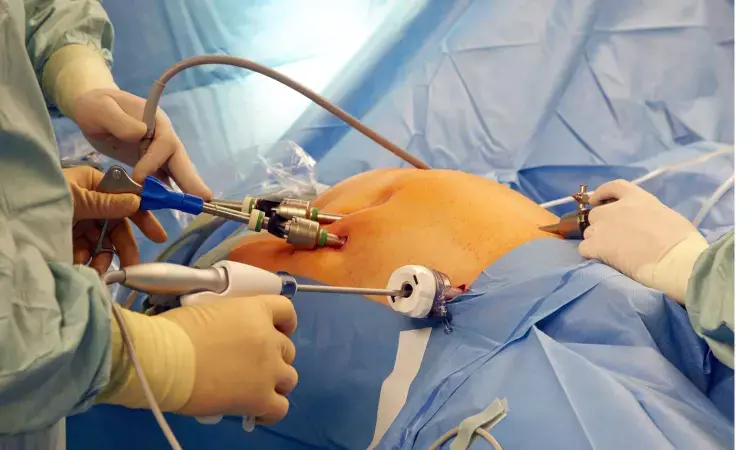- Home
- Medical news & Guidelines
- Anesthesiology
- Cardiology and CTVS
- Critical Care
- Dentistry
- Dermatology
- Diabetes and Endocrinology
- ENT
- Gastroenterology
- Medicine
- Nephrology
- Neurology
- Obstretics-Gynaecology
- Oncology
- Ophthalmology
- Orthopaedics
- Pediatrics-Neonatology
- Psychiatry
- Pulmonology
- Radiology
- Surgery
- Urology
- Laboratory Medicine
- Diet
- Nursing
- Paramedical
- Physiotherapy
- Health news
- Fact Check
- Bone Health Fact Check
- Brain Health Fact Check
- Cancer Related Fact Check
- Child Care Fact Check
- Dental and oral health fact check
- Diabetes and metabolic health fact check
- Diet and Nutrition Fact Check
- Eye and ENT Care Fact Check
- Fitness fact check
- Gut health fact check
- Heart health fact check
- Kidney health fact check
- Medical education fact check
- Men's health fact check
- Respiratory fact check
- Skin and hair care fact check
- Vaccine and Immunization fact check
- Women's health fact check
- AYUSH
- State News
- Andaman and Nicobar Islands
- Andhra Pradesh
- Arunachal Pradesh
- Assam
- Bihar
- Chandigarh
- Chattisgarh
- Dadra and Nagar Haveli
- Daman and Diu
- Delhi
- Goa
- Gujarat
- Haryana
- Himachal Pradesh
- Jammu & Kashmir
- Jharkhand
- Karnataka
- Kerala
- Ladakh
- Lakshadweep
- Madhya Pradesh
- Maharashtra
- Manipur
- Meghalaya
- Mizoram
- Nagaland
- Odisha
- Puducherry
- Punjab
- Rajasthan
- Sikkim
- Tamil Nadu
- Telangana
- Tripura
- Uttar Pradesh
- Uttrakhand
- West Bengal
- Medical Education
- Industry
Bariatric Surgery Reduces Risk of CRS and Sinus Surgeries by Up to 48% in Obese Patients: Study

USA: A recent study shows that bariatric surgery can lower the risk of chronic rhinosinusitis (CRS) and the need for sinus surgeries by as much as 48% in individuals with obesity. The new study published in The Laryngoscope highlights an additional benefit of bariatric surgery beyond weight loss—its potential to reduce the risk of chronic rhinosinusitis (CRS) and the need for functional endoscopic sinus surgery (FESS) in obese individuals.
Chronic rhinosinusitis, a persistent inflammatory condition of the sinuses, affects more than 10% of adults in the United States and significantly burdens the healthcare system. Its symptoms often overlap with other inflammatory conditions, such as asthma and allergic rhinitis, which are themselves strongly associated with obesity. With over 40% of the US population affected by obesity, understanding how weight-loss interventions influence inflammatory airway diseases has become increasingly important.
To investigate this, Shvetali Thatte and Mohamad R. Chaaban from Cleveland Clinic, Head and Neck Institute, Cleveland, Ohio, USA, conducted a large retrospective cohort study using data from the US Collaborative Network on the TriNetX Analytics Platform. The study included over 17 million adult patients with obesity, of whom 53,454 had undergone bariatric surgery. Patients in both the surgery and non-surgery groups were matched for demographics and common comorbidities, including tobacco use, asthma, and allergic rhinitis.
The following were the key findings of the study:
- Patients who underwent bariatric surgery had a 21% lower risk of developing chronic rhinosinusitis (CRS) within two years (RR 0.79).
- This reduced risk of CRS remained consistent at five years post-surgery (RR 0.79).
- At ten years following surgery, the risk of developing CRS further decreased (RR 0.73).
- Among patients with existing CRS, those who underwent bariatric surgery were 48% less likely to require functional endoscopic sinus surgery (FESS) at two years (RR 0.52).
- The reduced need for FESS continued at five years (RR 0.56).
- At ten years post-surgery, the likelihood of needing FESS further decreased (RR 0.50).
These findings suggest that bariatric surgery may offer a protective effect against CRS and its progression, likely due to the improvement in systemic inflammation associated with significant weight loss. Researchers also performed sub-analyses excluding patients prescribed GLP-1 receptor agonists—another class of weight-loss agents shown to affect respiratory health—to ensure the observed effects were attributable to bariatric surgery alone.
The authors conclude that in addition to metabolic and cardiovascular benefits, bariatric surgery may positively influence upper airway health. They advocate for further prospective studies to explore the biological mechanisms underlying these findings and to determine whether early surgical intervention could prevent the onset or progression of CRS in obese individuals.
As the obesity epidemic continues to grow, these findings underscore the potential for bariatric surgery to not only improve general health but also reduce the burden of chronic sinonasal disease and associated surgical interventions.
Reference:
Thatte, S., & Chaaban, M. R. Bariatric Surgery Lowers Incidence of Chronic Rhinosinusitis and Functional Endoscopic Sinus Surgery. The Laryngoscope. https://doi.org/10.1002/lary.32265
Dr Kamal Kant Kohli-MBBS, DTCD- a chest specialist with more than 30 years of practice and a flair for writing clinical articles, Dr Kamal Kant Kohli joined Medical Dialogues as a Chief Editor of Medical News. Besides writing articles, as an editor, he proofreads and verifies all the medical content published on Medical Dialogues including those coming from journals, studies,medical conferences,guidelines etc. Email: drkohli@medicaldialogues.in. Contact no. 011-43720751


